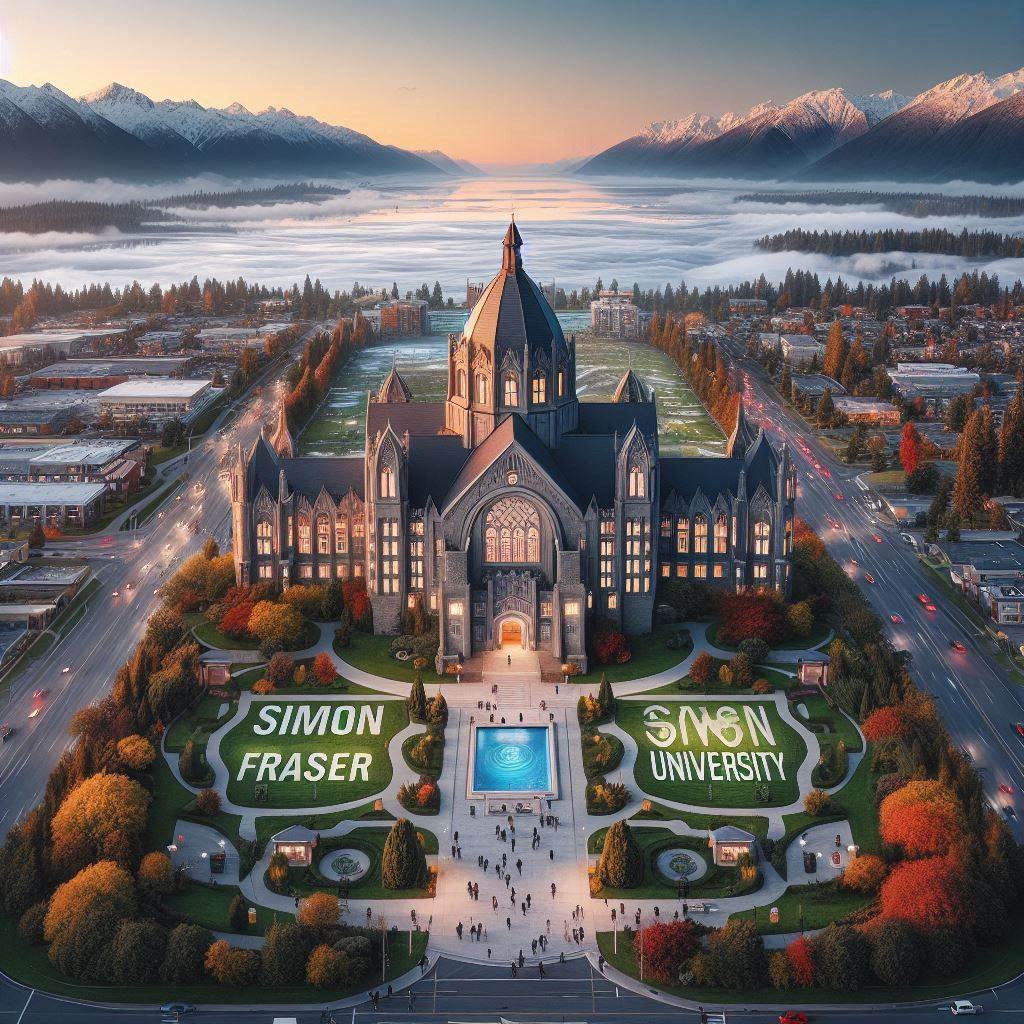Explore Simon Fraser University, ranked 6th in Canada and 73rd globally. Discover its programs, courses, tuition fees, admissions, and more.
Table of Contents
Simon Fraser University: Country Rank 6, World Rank 73
Simon Fraser University (SFU), located in British Columbia, Canada, is a renowned institution recognized for its commitment to research, innovation, and community engagement. With a national ranking of 6th and a global ranking of 73 according to the QS World University Rankings 2024, SFU provides a diverse array of programs and opportunities for students across various disciplines.

University Identity
Established in 1965, Simon Fraser University has earned a reputation for fostering an inclusive and vibrant academic environment. The university’s motto, “We Stand on Guard for Thee,” reflects its dedication to academic excellence and social responsibility. SFU emphasizes a multidisciplinary approach to education, integrating research and practical experiences to prepare students for global challenges.
Country and World Rank
Simon Fraser University is ranked 6th in Canada and 73rd globally in the QS World University Rankings 2024. This ranking highlights the university’s strong academic reputation, research output, and commitment to providing high-quality education.
University Location
Simon Fraser University has three campuses in British Columbia:
- Burnaby Campus: The main campus, located in Burnaby, features a comprehensive range of facilities and is known for its stunning natural surroundings and innovative architecture.
- Vancouver Campus: Situated in downtown Vancouver, this campus focuses on programs related to the arts, business, and communication.
- Surrey Campus: Located in Surrey, this campus offers programs in areas such as health sciences, engineering, and business, and serves a growing community in the region.
Fields of Study / Degree Levels
Simon Fraser University offers a wide range of undergraduate, graduate, and professional programs across various fields:
- Arts and Social Sciences: Includes programs in English, History, Political Science, and Sociology.
- Business: Offers programs in Accounting, Finance, Marketing, and International Business.
- Communications, Art, and Technology: Focuses on Media Studies, Interactive Arts, and Design.
- Engineering: Includes Civil, Computer, Electrical, and Software Engineering.
- Health Sciences: Covers Public Health, Biomedical Physiology, and Kinesiology.
- Science: Includes Biology, Chemistry, Physics, and Environmental Science.
Programs and Courses
The university provides a diverse selection of programs and courses designed to meet the needs of a broad range of students. Below is a summary of notable programs and courses:
Undergraduate Programs
| Program | Degree | Description |
|---|---|---|
| Arts and Social Sciences | BA | Includes majors in English, History, Political Science, and Sociology, focusing on critical thinking and research skills. |
| Business | BBA | Covers areas such as Accounting, Finance, Marketing, and International Business, preparing students for diverse business careers. |
| Communications, Art, and Technology | BA | Offers tracks in Media Studies, Interactive Arts, and Design, focusing on creative and technical skills in digital media. |
| Engineering | BEng | Includes specializations like Civil, Computer, Electrical, and Software Engineering, with a focus on technical expertise and innovation. |
| Health Sciences | BHSc | Provides training in Public Health, Biomedical Physiology, and Kinesiology, preparing students for careers in health and wellness. |
| Science | BSc | Covers disciplines such as Biology, Chemistry, Physics, and Environmental Science, emphasizing research and practical applications. |
Graduate Programs
| Program | Degree | Description |
|---|---|---|
| Arts and Social Sciences | MA, PhD | Advanced study in fields like History, Political Science, and Sociology, with opportunities for research and specialization. |
| Business | MBA | Focuses on strategic management, finance, marketing, and international business, with a strong emphasis on leadership and practical experience. |
| Communications, Art, and Technology | MA | Advanced study in Media Studies, Interactive Arts, and Design, including research and creative projects. |
| Engineering | MASc, MEng, PhD | Includes research and advanced study in Civil, Computer, Electrical, and Software Engineering, focusing on innovation and technical expertise. |
| Health Sciences | MSc, PhD | Advanced research in Public Health, Biomedical Physiology, and Kinesiology, with a focus on health and wellness. |
| Science | MSc, PhD | Research-focused programs in Biology, Chemistry, Physics, and Environmental Science, emphasizing scientific investigation and discovery. |
Professional Programs
| Program | Degree | Description |
|---|---|---|
| Business | Professional Certifications | Includes specialized certifications in areas such as Finance, Marketing, and Project Management. |
| Health Sciences | Professional Degrees | Advanced training and certification in Public Health, Biomedical Sciences, and Kinesiology. |
Course Descriptions
Undergraduate Courses
- Bachelor of Arts (BA)
- English: Includes courses in literary analysis, creative writing, and cultural studies.
- History: Covers global and regional history, historiography, and historical methods.
- Political Science: Focuses on political theory, international relations, and public policy.
- Sociology: Examines social behavior, institutions, and inequalities.
- Bachelor of Business Administration (BBA)
- Accounting: Study of financial reporting, auditing, and taxation.
- Finance: Includes investment analysis, corporate finance, and financial markets.
- Marketing: Focuses on market research, consumer behavior, and brand management.
- International Business: Examines global trade, international finance, and cross-cultural management.
- Bachelor of Communications, Art, and Technology (BA)
- Media Studies: Covers media production, analysis, and theory.
- Interactive Arts: Focuses on digital media, game design, and interactive technology.
- Design: Includes courses in graphic design, digital media, and user experience.
- Bachelor of Engineering (BEng)
- Civil Engineering: Study of infrastructure design, construction materials, and structural analysis.
- Computer Engineering: Focuses on computer systems, hardware, and software engineering.
- Electrical Engineering: Includes courses in electrical circuits, power systems, and electronics.
- Software Engineering: Covers software development, algorithms, and system design.
- Bachelor of Health Sciences (BHSc)
- Public Health: Study of epidemiology, health policy, and disease prevention.
- Biomedical Physiology: Focuses on human physiology, biomedical research, and health sciences.
- Kinesiology: Includes exercise science, sports performance, and physical therapy.
- Bachelor of Science (BSc)
- Biology: Covers genetics, ecology, and cellular biology.
- Chemistry: Includes organic, inorganic, and physical chemistry.
- Physics: Focuses on mechanics, electromagnetism, and quantum physics.
- Environmental Science: Examines ecological systems, environmental policy, and sustainability.
Graduate Courses
- Master of Arts (MA)
- History: Advanced research in historical periods, historiography, and methods.
- Political Science: Focuses on political theory, international relations, and policy analysis.
- Sociology: Research in social phenomena, institutions, and inequalities.
- Master of Business Administration (MBA)
- Finance: Advanced study in financial strategy, investment management, and corporate finance.
- Marketing: Includes strategic marketing, consumer behavior, and brand management.
- International Business: Focuses on global business strategies, trade policies, and cross-cultural management.
- Master of Communications, Art, and Technology (MA)
- Media Studies: Advanced analysis of media production, theory, and digital culture.
- Interactive Arts: Focuses on digital media, game design, and interactive technologies.
- Master of Engineering (MEng, MASc)
- Civil Engineering: Advanced study in structural engineering, geotechnical engineering, and environmental engineering.
- Computer Engineering: Research in computer systems, embedded systems, and network design.
- Electrical Engineering: Focuses on power systems, communications, and control systems.
- Software Engineering: Advanced topics in software design, development methodologies, and system integration.
- Master of Health Sciences (MSc)
- Public Health: Advanced research in epidemiology, health policy, and health promotion.
- Biomedical Physiology: Study of physiological systems, biomedical research, and health sciences.
- Kinesiology: Research in exercise science, sports performance, and physical rehabilitation.
- Master of Science (MSc)
- Biology: Research in genetics, ecology, and cellular biology.
- Chemistry: Advanced study in organic, inorganic, and physical chemistry.
- Physics: Focus on experimental and theoretical physics, including quantum mechanics and condensed matter physics.
- Environmental Science: Research in ecological systems, environmental policy, and sustainability.
Tuition Fees
For the 2023-2024 academic year, tuition fees at Simon Fraser University are as follows:
| Program | Undergraduate (CAD/year) | Graduate (CAD/year) |
|---|---|---|
| Arts and Social Sciences | $5,500 – $7,500 | $7,500 – $12,000 |
| Business | $7,000 – $9,500 | $10,000 – $15,000 |
| Communications, Art, and Technology | $6,000 – $8,000 | $8,000 – $12,500 |
| Engineering | $8,000 – $10,000 | $11,000 – $16,000 |
| Health Sciences | $6,500 – $8,500 | $9,000 – $13,000 |
| Science | $5,500 – $7,500 | $8,000 – $12,000 |
Admission Details
The admission process at Simon Fraser University is competitive, and requirements vary by program. Below are the general admission requirements:
Undergraduate Admission Requirements
- High School Diploma: Completion of a recognized high school diploma or equivalent.
- Grade Point Average (GPA): A competitive GPA, typically around 3.0 or higher on a 4.0 scale.
- Standardized Tests: Submission of SAT or ACT scores for applicants from the United States.
- English Language Proficiency: Proof of English language proficiency for non-native English speakers, usually through TOEFL or IELTS scores.
- Supplementary Application: Some programs may require additional materials such as essays, portfolios, or interviews.
Graduate Admission Requirements
- Bachelor’s Degree: Completion of a recognized bachelor’s degree or equivalent.
- Grade Point Average (GPA): A competitive GPA, typically around 3.0 or higher on a 4.0 scale.
- Standardized Tests: Submission of GRE or GMAT scores for certain programs.
- English Language Proficiency: Proof of English language proficiency for non-native English speakers, usually through TOEFL or IELTS scores.
- Letters of Recommendation: Submission of letters of recommendation from academic or professional references.
- Statement of Purpose: A personal statement outlining the applicant’s academic and career goals.
- Research Proposal: For research-based programs, submission of a research proposal may be required.
Conclusion
Simon Fraser University, ranked 6th in Canada and 73rd globally, stands out for its diverse programs, research opportunities, and vibrant academic community. With competitive tuition fees and a rigorous admission process, SFU offers students a high-quality education and prepares them for success in their chosen fields. For more information on programs, admissions, and tuition fees, visit the Simon Fraser University official website.

